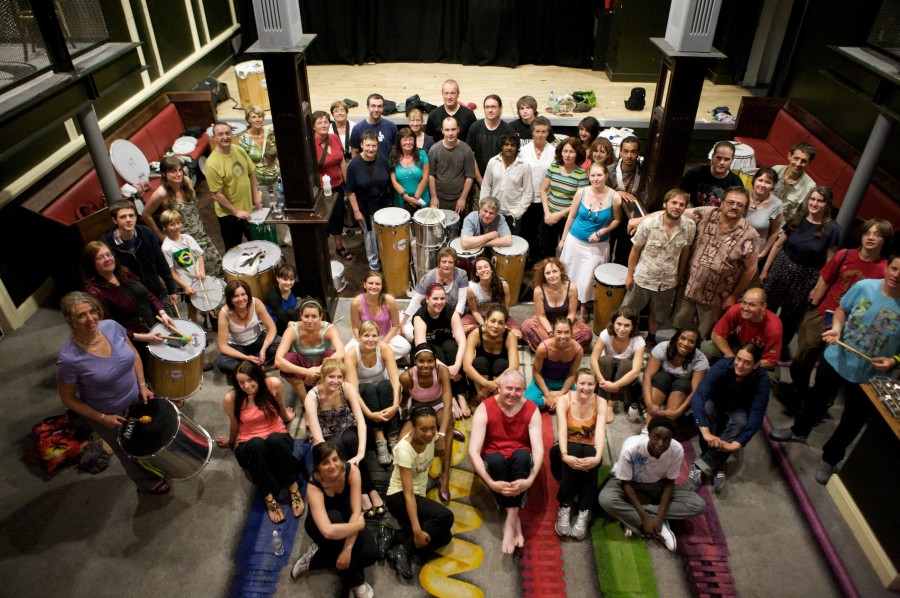Dates: Every Wednesday from 03/11/10 to 15/12/10
Times: 7.15pm to 9.15pm
Price: £55.00 or £10.00 per session (payable on arrival at the box-office)
Course Leaders: Eraldo Marques and Adriana Rosso.
Back by popular demand. This term Band on the Wall in collaboration with Bangdrum workshops are running a seven week introduction to traditional Brazilian Samba with full Bateria, dance and song. Suitable for complete beginners to experienced and advanced players and dancers. Instruments are provided. Just come along and get involved. A great way to meet people and learn something new.
For Percussionists:
Following an introduction to Samba from Director Eraldo Marques and Choreographer Adriana Rosso, participants will have a snap shot of life in a Brazilian Samba School Bateria. Students will study the relationship between the songs (used in the carnival ‘Enredo’ or theme) and the percussion arrangements, learning how these fit together in a Samba School carnival presentation.
Participants will be presented with several short melodies and will then be asked to vote on the ones they prefer the most. These melodies will be used throughout the course and a new arrangement will be developed using Breaks directly adapted from real Brazilian Samba Schools.
Participants will sing and play simultaneously whilst developing movements and choreography in preparation for the final collaborative rehearsals with the Dance group.
This is an open level course (suitable for all) with some instruments only suitable for intermediate and advanced players. Please read the notes on instrumentation and levels below.
Surdo n1 – Advanced players only
Surdo n2 – Intermediate or Advanced only
Surdo n3 – Advanced only
Caixa – beginners to advanced
Repinique– Beginners to advanced
Tamborim-Advanced only
Shakers-Intermediate/Advanced only
Agogo– Beginners to Advanced
For Dancers:
Dancers will discover the world of Brazilian Samba taking reference from the many different styles from around Brazil. We will study different Samba techniques and how these work with different samba styles and traditions. A strong emphasis will be on understanding how changes in tempo, feel and ‘breaks’ work with Samba steps and short choreography. Dancers will learn how to ‘listen’ to Brazilian samba and improve their overall understanding of Samba dance.
The course will culminate in combined rehearsals with the percussionists, demonstrating dance and arrangements taken directly from the Samba Schools of Sao Paulo and Rio.
This is an open level for beginners to advanced dancers.
Course Level and instrumentation:
LEVELS
All of the Global Grooves courses are designed for participants of different levels and abilities.
These levels are clearly stated within each course description. If you are unsure what level you are at then please contact one of our team prior to the first workshop. It is essential that you are honest about your level of experience to make sure that the group is not held up and to insure that you get the most out of your studies.
To help you decide which level you are at we have given some examples below.
Beginner:
These courses are suitable for people who are new to drumming or have little experience of their chosen instrument. We consider most beginners to have played for less thanfive years.
Intermediate:
These courses are for participants who have a good understanding of their chosen instruments with a good understanding of sounds (for example tones / slaps / rolls / rim shots etc). We consider most intermediate players to have played there chosen instrument for over five years.
Advanced:
These courses are designed for percussionist with an advanced knowledge of their chosen instrument and style. Players must have an excellent understanding of sounds (for example tones / slaps / rolls / rim shots etc) and have a good understanding of the relationship of their chosen instrument, clavé and other instruments in an ensemble. We consider most intermediate players to have played there chosen instrument for over 10 years.
We have tried to give this information and guide as clearly as possible. We feel that understating your level of ability is essential to the personal development of any musician. Many other styles of music and instruments in the UK are clearly graded with exams that do not relate to many international percussion styles. Due to this we have tried to capture what skills are needed without the need for exams or grades. In the past we have had many participants try to play in workshops far above their levels of ability and this had cause a negative effect on group’s progress.


